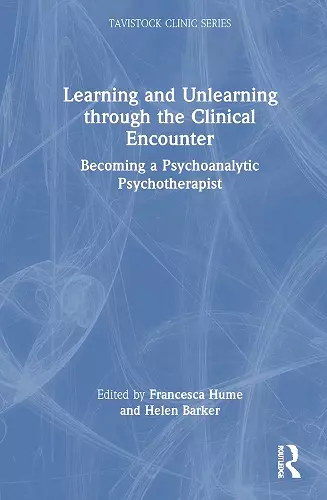Learning and Unlearning through the Clinical Encounter
Becoming a Psychoanalytic Psychotherapist
Helen Barker editor Francesca Hume editor
Format:Hardback
Publisher:Taylor & Francis Ltd
Published:13th May '25
£130.50 was £145.00
Supplier delay - available to order, but may take longer than usual.
This hardback is available in another edition too:
- Paperback£32.99was £32.99(9781032901916)

This book examines the learning process involved in becoming a psychoanalytic practitioner and presents training experiences at the Tavistock and Portman NHS Foundation Trust through the lens of both teachers and trainees.
The book describes the relevant history at the Tavistock and how psychoanalytic knowledge is acquired through a process of learning from experience and the fostering of a culture of enquiry. The contributors also present their interpretations of what is meant by analytic learning and how this is acquired for a psychoanalytic attitude to become possible. The book includes a mix of chapters by more experienced clinicians setting out what can be useful in training, balanced by other chapters from more recent trainees who reflect on their development and experience of that training. Other important sections focus on the experience and importance of supervision and on how to respond to clinical challenges in training and practice, specifically public-sector-based trainings.
With rich clinical vignettes and personal reflections on training experiences, this book is key reading for all psychoanalysts and psychotherapists involved or interested in training.
'This remarkable book occupies a unique position in its capacity to show the how of learning what might be best called a psychoanalytic attitude. This particular orientation towards a patient and towards mental suffering has a very wide reference, as this book amply demonstrates. Foundational to this, is that such an attitude cannot be learnt as if it were a technique to be applied, but instead requires an engagement with an evolving process, a process that any trainee necessarily goes though, and something that continues throughout one's professional life. It shows how the trainee learns from experience, makes mistakes but then finds that understanding the mistake, really thinking it through rather than dismissing it, provides a new insight into the nature of the work and of one’s own relation to it. This dialectical way of thinking, where a “mistake” is not just something to be avoided or corrected but becomes the basis for an evolution of thought, has been part of psychoanalysis since Freud's very early papers where what seemed at first like mistakes, became the source of a new orientation to the work.
Having established this central theme of the work, the book goes on to show its very wide reference. We are given a kind of window on the development of the trainees as psychanalytic psychotherapists and this encompasses some very varied themes and situations including those that affect the setting such as the therapist’s pregnancy, issues of cultural and sexual diversity, etc. The whole book is held together by the editors' overarching vision in the provision of an introduction to each section. In this way they give us not only a model way of presenting this work but one gets a profound sense of their extraordinary skill and commitment in leading this world renowned training which has been the absolute core of adult psychoanalysis at the Tavistock.
It is a unique book - an overused word I know but there really is nothing to compare to it in terms of proving a model for training in psychoanalytic thinking. As such it will occupy a very important position in the psychoanalytic literature of considerable relevance not only to psychoanalytic psychotherapy and to psychoanalysis but broadly but to all those varied settings in which psychoanalyse can make a contribution. Any mental health practitioner will also find a great deal to stimulate thought about their work.'
David Bell
'This important book describing the training of psychoanalytic psychotherapists will interest all those involved in education or indeed anyone wishing to foster curiosity and learning. It gives priority to learning from experience rather than from books and teachers and specifically focuses on what has become known as the psychoanalytic attitude. The central aim in training is to understand the patient and the interaction with the therapist, setting to one side the question of how to help the patient directly. The authors show that for many trainees this means the unlearning of the more usual approach of directly trying to offer relief and reassurance. This commonly means that pain and sorrow have to be endured at least until they are better understood.
The authors admirably illustrate the personal struggle that must be worked through in chapters provided by both trainees and trainers. It is a fascinating account that is all the more remarkable from an NHS service that continues to be underfunded and undervalued.'
John Steiner
'This is a brave and uncompromising book. Learning how to become a psychoanalytic psychotherapist is its main theme. This book should be an inspiration to those who value in-depth approaches to mental health and well-being.'
Michael Rustin
ISBN: 9781032909066
Dimensions: unknown
Weight: 770g
300 pages